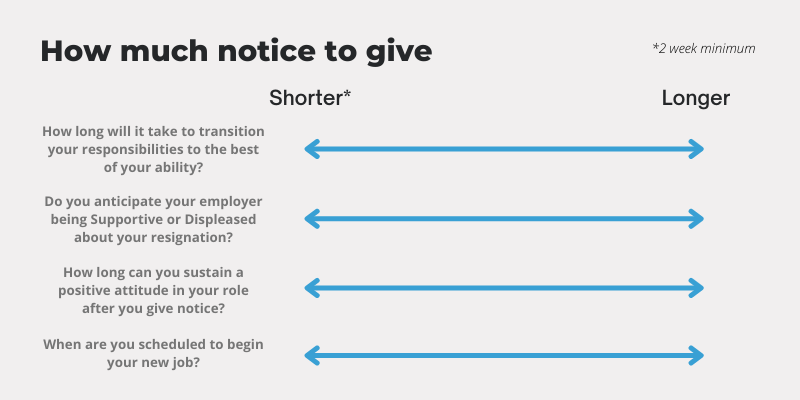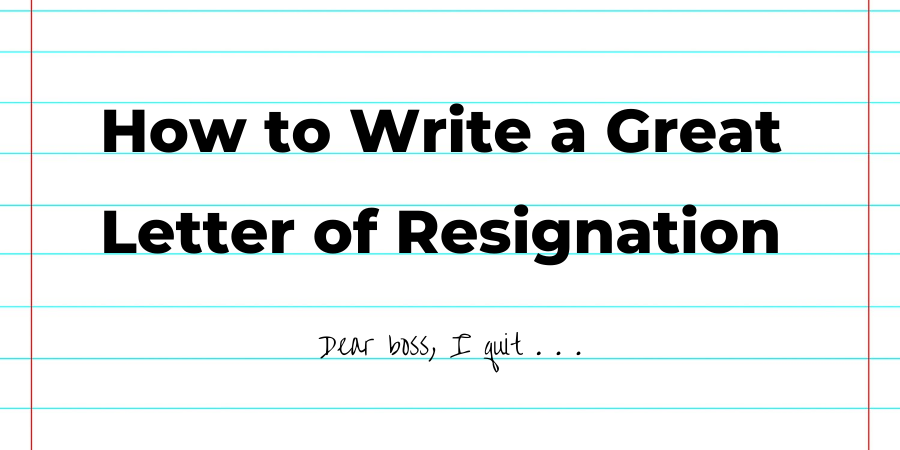It’s not always easy letting your manager know you’re moving on to a new job. It’s a natural part of everyone’s careers, but still, it can be a difficult, or even daunting thing to do.
If you’re like the many Americans trying to find new and better jobs, then quitting where you are right now is an inevitable part of the process.
So how do you write a letter of resignation? How do you sound genuine while still being truthful? Does there need to be a hard copy or can you write a letter of resignation email? How do you even know if this is the right time to quit your job?
We’ll answer all of these questions (and more) in this guide and link to a letting of resignation template that you can use.
Let’s dive in and get you one step closer to quitting your job and finding the one that’s right for you.
Quitting Your Job: When it’s time to resign
If you’ve been thinking about quitting your job for a long time, it’s probably time. Especially if you're feeling like this:
%20(1).png?width=900&name=Quitting%20Your%20Job%20(2)%20(1).png)
Everyone goes through difficult periods in their jobs. No job is perfect, but if it’s a challenge everyday, and there’s not much bringing you joy, it’s probably time.
Sometimes it’s a calculated decision: if you’re not making ends meet, if you’re not paid market value, if you are not learning new things and are bored. But a lot of the time, quitting your job is a gut decision. You’re no longer happy. You no longer feel valued. If that’s the case, then it’s definitely time to quit your job.
If you have some good days but there are things that need to be improved, make sure you have a candid conversation with your manager. If they value your talent and you as a person, they’ll try to make things work. Maybe you need a raise, maybe it’s more PTO, maybe you need to switch teams? Whatever it is, try to work it out with your employer before you jump to a new one.
If you don’t have that good Monday anticipation, or you’re feeling like there’s nothing left for you at this job. Keep on reading. It’s time to quit.
P.S. If you’re this close to resigning but still need to snag a job, check out thousands of purpose-driven jobs on our job board.
Quitting Your Job: Do you have to give two weeks notice
Before you get to the actual resigning part, it’s important to ask yourself how many weeks of notice you will give. The normal is two weeks. This is the socially acceptable standard that gives both you and your employer some time to plan for you to transition out, tie up loose ends, and distribute your high priorities / relationships to others.
When I gave my notice, I was a bit naïve and gave 6 weeks.
Don’t do this.
I am a very loyal person and felt bad for leaving even though it was right for all parties, but I also managed 30+ accounts that I wanted to ensure were transitioned to the best of our ability. However, it’s very hard to stay invested in something that you’re on your way out of. Those were a very long 6 weeks.
Here’s what I advise. Take the time to consider how you can successfully transition your responsibilities, the relationship with your employer, your attitude, and of course when you’re scheduled to begin your new job. (Tip: If it’s financially feasible, schedule yourself a week off between jobs.) From there, give a minimum of 2 weeks but no more than probably 3 (or maybe 4) weeks notice.
Here’s a chart to help you think it through, though remember, you can always just stick with the standard 2 weeks. That itself is a courtesy and not required.

A few other thoughts:
-
Making your final day a Friday is pretty normal. It just makes sense as it’s the end of the week. However, you’re not tied to this.
-
Quitting your job on a Friday can minimize awkwardness and give everyone the weekend to decompress.
-
If you don’t have your next job lined up, think about health insurance. In most cases, your health insurance premium is paid at the beginning of the month and covers you through the end of the month, even if you leave mid-month. So if your last day is March 28th, you’ve got health insurance for another two days. If your last day is April 2nd, you’ve got health insurance for another 28 days.
Quitting Your Job: How to resign
Okay, so maybe don't scream and slam doors. But yes, in some cases, parting ways with your employer might be really painful and awkward if they choose to be upset with you (The Displeased Employer). Ideally, your manager will understand and truly wish you the best in future endeavors (The Supportive Employer). As you consider how to resign, it’s important to understand which of these two scenarios you fit into.
When it came time for me to leave my last position, I’d been contemplating the idea for about 6 months. I’d spent over three years with the organization and truly loved the work we’d been doing. By the end though, I was wiped, and I was no longer excited for Mondays. It was time to close that chapter.
I’m someone who very much approaches hard things with vulnerability. I find it more meaningful to have those conversations in person, not by sending an impersonal email. Yes, that conversation was hard. Yes, my heart raced. Yes, it was uncomfortable. But I did it anyway. And I value those who pay me the same respect (as a manager who’s had an employee resign via email, it’s very heartbreaking).
So when I resign from a job, I will always aim to tell my manager face-to-face (or video-screen to video-screen). I encourage you to do the same. But first, consider which employer you work for — the Supportive or the Displeased — and think through your approach.
Conversation, Letter, or Both?
Although things had been unraveling in my final months with my last company, I knew I fit into The Supportive Employer box, where the organization would understand my decision and wish me the best moving forward. Knowing this, I even had multiple transparent conversations with my manager 2 - 3 months before I officially decided to leave. I had shared where my head was at and clearly stated that I thought it might be time for me to move on. In response, I received understanding and support to do what was best for me. For that, I’m very grateful.
When it came time for my official resignation, I simply had another conversation with my manager. I let her know that it was time, and I shared my last day. I didn’t even write a letter of resignation until the HR team asked me to do so for their records. At that point, it was about three sentences that simply stated the facts (including my last date) and expressed my gratitude.
Let’s consider the opposite: when you’re working for The Displeased Employer and won’t be surprised if they’re upset and maybe even angry that you’re resigning. In these cases, it’s better to handle your resignation in a firm manner. In that case, I’d recommend writing a letter of resignation, though I’d still hand deliver it during a one-on-one conversation. Just have it printed and ready to hand over as you share the news. You’ll find tips for writing the actual letter later on.
Looking back on my own recent resignation, writing a heartfelt letter expressing my gratitude seems like it would have been a nice touch, but regardless of whether your employer is the Supportive or Displeased type, I think having a real and vulnerable conversation both when you resign and leading up to the resignation (you shouldn’t let problems fester and quit to solve them) is the most authentic way to approach the situation.
Quitting Your Job: How to Write a Letter of Resignation
If you choose to write a formal letter of resignation, there are some tips you can use to make sure your letter has all the important information, but isn’t too difficult to write.
Often, the goal of the letter is to have something on file for HR, so you don’t need to sweat it. Other times, it’s the way to give the news to your manager, so you want to be sensitive about what’s in it. Either way, there are some things you can do to keep it short, informative, and make sure you’re leaving without burning any bridges.
1. Use a formal business format
It’s professional, so keep that format in mind.
2. Give the relevant information
First, that you’re quitting your job. Second, when your last day is.
3. Keep it short and sweet
Leave the negative emotions behind. You don’t want to burn bridges or jeopardize a good reference down the line.
For more details and tips for writing a letter of resignation, check out this in-depth article and free template here.
Quitting Your Job: How to find a job you love
Many people find a new job and then quit, but for some, quitting without the next gig lined up is part of the process. And that’s okay!
Maybe you’re thinking, “Yes, I quit! … Now what?” Don’t worry. We got your back.
If you’re not sure what you want to do next, take this time off (or your two week transition period from your old job) to figure out what you want to do.
Start by asking yourself: what am I good at, and what brings me joy?
Perhaps you want to find a position that challenges you. Perhaps you want to make a totally new career pivot (our friends Will and Macy talk all about their pivots after working at Facebook, check out their advice). Perhaps you want to do something similar to your previous role, but with a purpose-driven company and team.
It’s important to understand your values and what matters to you. When searching for your next company, make sure those values align with theirs, and that you can bring your authentic self to the company.
There are lots of job boards and communities out there, and many are geared toward regions or roles. At Purpose Jobs, we’re building a community for purpose-driven people and companies. So if mission/purpose is at the top of your mind, be sure to check out the great companies hiring in the Midwest and for remote roles.
The job hunting process can be hard, but you’re not alone. And we’re always here to help.

%20(1).png?width=950&name=Quitting%20Your%20Job%20(1)%20(1).png)







.png?width=50&name=Erin%20Gregory%20(1).png)


